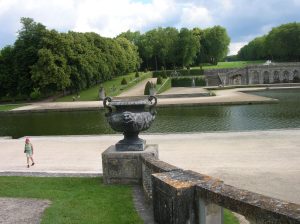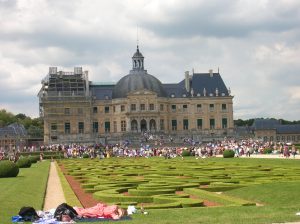The authors I met at the recent conference of the Historical Novel Society were in agreement that there’s an obligation to both the subject and the reader to get the facts right in situations where the facts are there to be discovered, whether through research or direct experience. We write fiction, and of course the imagination rules supreme, but the stories need to be grounded firmly in

their particular environment. I have been fortunate enough to be able to travel to the places where all my books have been set–Venice, Greece, and now France, in addition to Lithuania for my narrative non-fiction book Until Our Last Breath.
Some of the most emotionally dramatic scenes in my new novel-in-progress, The Laws of Motion, are set at Vaux-le-Vicomte, a chateau about an hour by car from Paris. Since Fontainebleau and Versailles are more famous, I expected to see only a few tourists, but it turned out the day I had chosen for the visit was the annual celebration of the courtly era at the chateau, and thousands of French people had shown up costumed for the event. It was a lot of fun to turn around and see Voltaire, or a woman in a dress I could imagine my characters wearing as they strolled the same grounds.
And, as usual, I discovered I had a lot of the details wrong. One scene simply could not have happened the way I described, despite having pored over photos of the location before writing it. Another whose accuracy I doubted

turned out to be plausible just the way I had it. But best of all was the moment when I saw the game room inside the chateau and discovered, to my astonishment and delight, a table and two chairs set up for the popular game of trictrac–just like a scene in the book where my protagonist, Lili, gets the better of a young man she dislikes. Sometimes it’s all so real it stops you dead in your tracks!
Today, Versailles. Always deeply conflicting to witness that kind of grandeur. I’ll be glad to move on from it.
